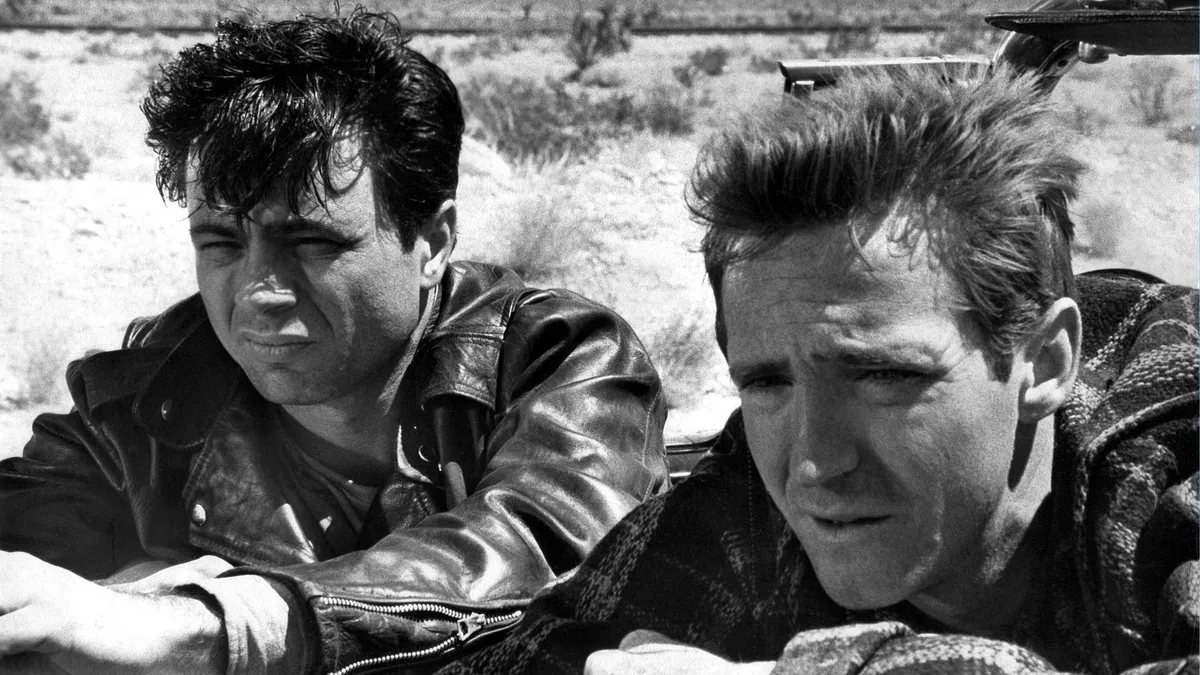In Cold Blood: A Masterful Story of Dispassionate Evil

After a botched robbery results in the brutal murder of a rural family, two drifters elude police, in the end coming to terms with their own mortality and the repercussions of their vile atrocity. 1
In Cold Blood is a disturbing, mesmerising study of senseless violence, the damaged people responsible, and a society without answers. Its many brilliant elements come together to carve away a part of your soul.
It would be difficult to make a poor film of Truman Capote’s finest work. The novel’s detailed and innovative structure is the bedrock on which director Richard Brooks builds his foundations. Brooks makes extensive use of match-cutting and irony to mirror the book’s triple narrative. Some detail is sacrificed2 but the result is an efficient story that doesn’t waste even a single scene.
Brooks’ attention to detail during the production of In Cold Blood is well-known. He shot on the real-life location of the events, including the murders. He even used the actual toilets from the killers’ prison cells. It’s chilling to consider this as the film unfolds with a complete lack of sensationalism.
Many critics describe it as documentary-like. A fair description, but I saw too many New Wave influences to be comfortable using that term. The subjective presentation of flashbacks contrasts with the realist elements in other scenes. This conflict of style is a hallmark of New Wave cinema and it evokes the works of Truffaut, Rohmer or Godard. The author’s hand shaping our view of reality to present something more truthful than fact.
That truth is bleak.
In Cold Blood’s depiction of the central crime disturbs more than any modern true-crime “documentary” ever could. Not until the killers’ are caught, questioned, then transported to jail are we told the details of that night. In the front seat of the detective’s car, Perry Smith (Robert Blake in a brilliant, tortured performance) reveals all. By the end, we realise how little we wanted to know. We realise how asinine the crime was. We remember that it was all for the oft-repeated sum of forty dollars.
Smith’s abusive childhood is offered as cause for his criminality. Dick Hickock (a sickeningly charming Scott Wilson) was a star athlete and well-liked as a young man. Medical history is his excuse. We are not given a single answer; merely a number of possibilities.
In Cold Blood’s central question then turns to ‘how’.
It’s asked during the execution of the two killers. Far from a cathartic moment of justice, the hanging takes the form of an administrative procedure performed in a disused warehouse. Various lawmen and reporters gather in the inky black confines, huddled away from pouring rain and puffing solemnly on cigarettes. The first to die is Hickock who, confident as ever, accepts his fate and says “no hard feelings”.
Brooks’ focus is on Smith. His reserved demeanour is tested in the face of death. During the murders, Smith stopped Hickock from raping the sixteen year-old daughter of the family, saying “I despise people who can't control themselves.” Now as he awaits the gallows, he begs his captors to use the toilet, afraid of soiling himself in death. The guard tells him “Control yourself.”
Quincy Jones’ cool score has long disappeared. All that’s left as Smith stands on the trapdoor are the words of his priest, the relentless rain and the thud of his own heart. The lever is pulled and Smith comes down. His death is photographed distant and cold before a cut to black. The end of the picture and his life. I stared at myself in the television screen. It was as if I’d become one of those lawmen or reporters in that warehouse. A witness to the justice system’s futile response to meaningless horror.
How do we reckon with violent and evil acts? How do we triumph against circumstances that defy all the ways of understanding the world around us? Is there any way we can?
Jensen3 (Paul Stewart), a magazine journalist, shares a short dialogue with another reporter as Hickock’s body is cut down:
Alvin Dewey: Coming?
Reporter: What for? What does it add up to, anyway?
Alvin Dewey: Well, four innocent and two guilty people murdered. Three families broken. Newspapers have sold more papers. Politicians will make more speeches. Police and parole boards will get more blame. More laws will be passed. Everybody will pass the buck. And then, next month, next year... the same thing will happen again.
Reporter: Well, maybe this will help to stop it.
Alvin Dewey: Never has.
Enjoy? Why not Subscribe via email to keep up to date. Follow me on Bluesky or Letterboxd. If you're feeling generous, why not throw me a few quid on Ko-fi?